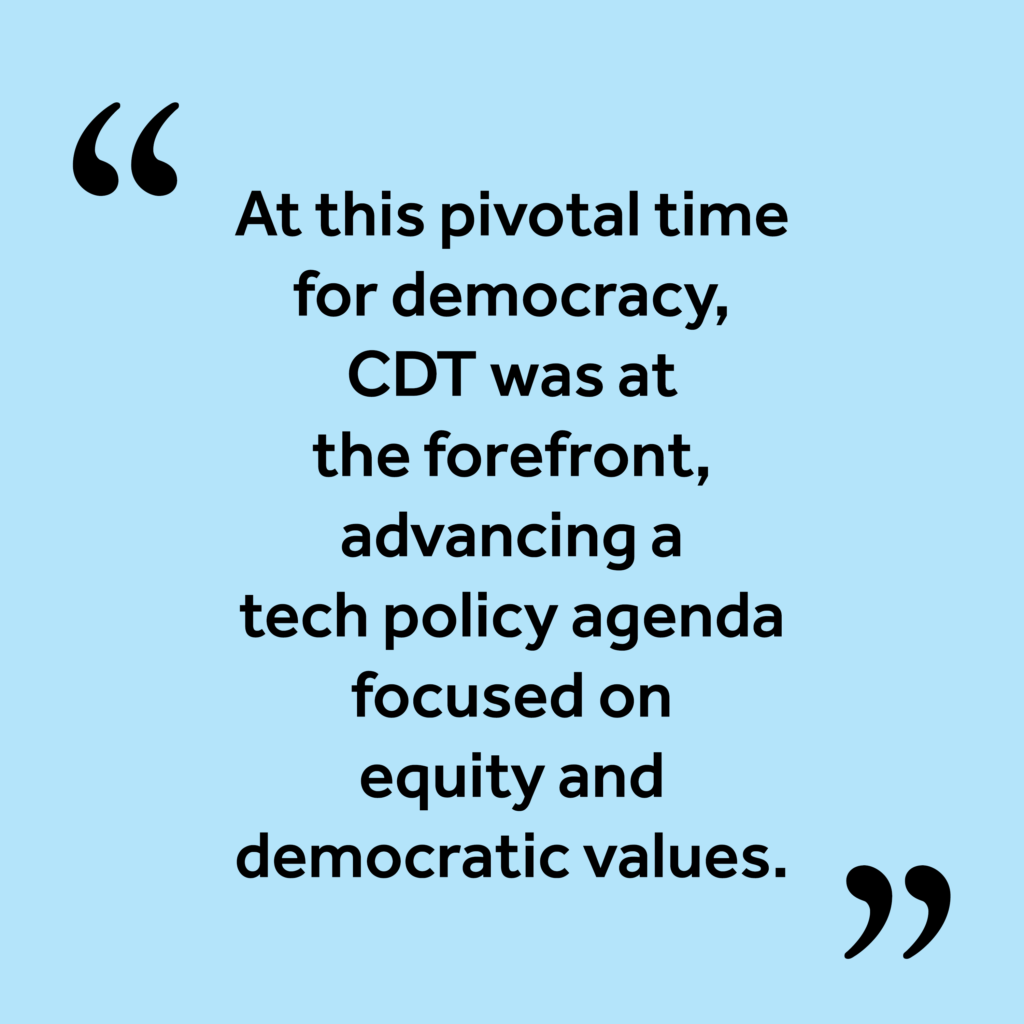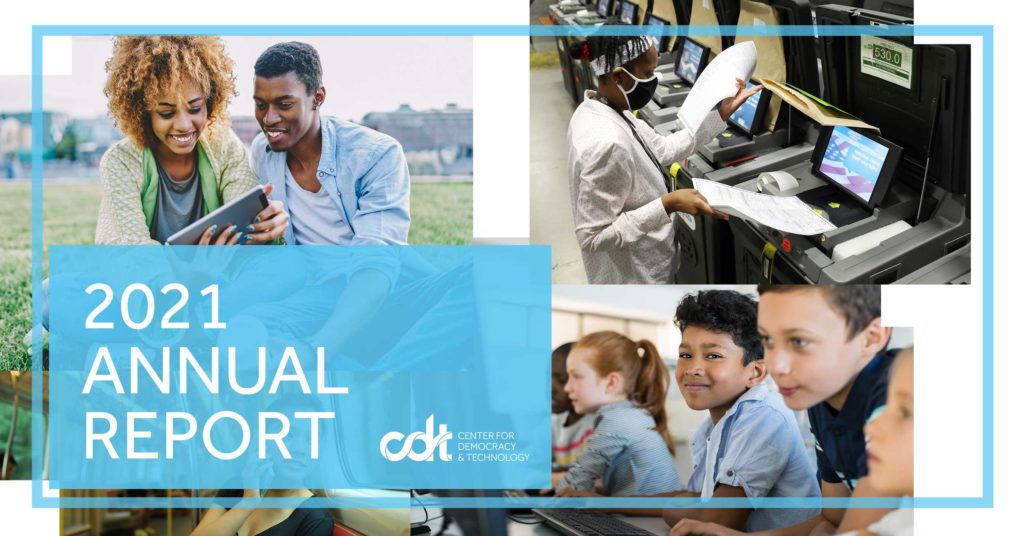
Letter from Our CEO
CDT President & CEO Alexandra Reeve Givens: “2021 marked a time of new beginnings in tech policy, with a new Administration and new Congress in the United States, and a robust tech agenda in Europe.”
Below are some of our proudest accomplishments from 2021, covering every issue we work on and involving every person on our team. Our work has never been more important.
Providing a Tech Policy Roadmap for the Biden Administration & Congress
When the Biden Administration and the 117th Congress assumed office in 2021, CDT published our tech policy recommendations for new leaders to advance civil rights and protect civil liberties. As the nation grappled with the COVID-19 pandemic, the January 6th assault on the Capitol, attacks on election integrity, and increasing divisiveness in social discourse, CDT underscored that questions of connectivity, online speech, election integrity, government surveillance, privacy, and security are more important than ever. We also emphasized that the President’s pledge to combat racial inequality must include a deep focus on technology.
With our allies in the civil rights community, we submitted detailed recommendations on tech policy priorities for federal agencies focused on employment, housing, and lending — work that bore fruit throughout the year as the Equal Employment Opportunity Commission, Consumer Financial Protection Bureau, Federal Trade Commission, National Telecommunications Information Administration and White House each announced efforts to combat discriminatory uses of data.
CDT Europe: Leading on the Digital Services Act and More
As CDT intensifies its advocacy with European policymakers to ensure the proposed Digital Services Act conforms to democratic and human rights standards, our European team added new board members and staff in 2021. Mireille Hildebrandt, a legal scholar renowned for her work on upholding the rule of law in the digital environment, joined the CDT Europe Board along with Morten Kjaerum, former head of the EU’s Fundamental Rights Agency, who now leads the Raoul Wallenberg Institute of Human Rights and Humanitarian Law.
Our Brussels office gained two new staff: Asha Allen, Advocacy Director for Europe, Online Expression & Civic Space, who comes to CDT from the European Women’s Lobby, and Ophélie Stockhem, a lawyer specializing in human rights law.
In addition to submitting extensive feedback on the Digital Services Act to the European Commission, our expanded Brussels team also led efforts on the European AI Act, the European Democracy Action Plan, the European Commission’s proposal on political advertising, anti-encryption proposals, and more.
Making a Difference Globally
CDT’s transatlantic presence puts us in the midst of renewed international dialogue about tech regulation and governance.
In September and December 2021, CDT President and CEO Alexandra Reeve Givens was one of a handful of experts invited to address the US-EU Trade & Technology Council (TTC) as it set priorities for cooperation. In November, the Director of CDT’s Free Expression Project Emma Llansó discussed the challenges and opportunities for protecting human rights online at the Paris Peace Forum. Sharing the virtual stage with U.S. Vice President Kamala Harris, French President Emmanuel Macron, Canadian Prime Minister Justin Trudeau and others, Emma outlined CDT’s vision for centering human rights as the foundation of technology policy.
CDT also participated in the Summit for Democracy, which brought together leaders from over 100 governments in support of democratic renewal. We engaged with government stakeholders on how the Summit could uphold an open, accessible, interoperable internet grounded in respect for human rights and democratic values, and joined calls for governments to crack down on the use, sale, and export of surveillance technology. We also hosted a discussion on the global fight for internet freedom, highlighting the rise of politically-motivated internet shutdowns and government pressure to influence social media companies’ content moderation decisions.
Uncovering How the Government Evades the Law to Buy Your Info from Data Brokers
Data brokers are collecting vast amounts of sensitive personal information about users and selling it, in a market already estimated at $200 billion and growing. A 2021 CDT report found that numerous government agencies, including law enforcement and intelligence agencies, are taking advantage of legal loopholes to access this data — without a warrant or other legal process.
In “Legal Loopholes and Data for Dollars,” we reported that the use of such data by law enforcement may have disproportionately negative impacts on communities of color and immigrant communities. Data is being acquired and used without individual consent or even awareness. Indeed, brokers typically have no direct relationship with the people whose data they collect, analyze, and sell.
CDT is urging policymakers to implement about a dozen measures that will close existing legal loopholes and provide greater transparency and accountability for government purchases of personal information from data brokers.
New Project on Workers Rights & Tech Examines Bossware, AI in Hiring, & More
Bossware — technology that allows supervisors to monitor employees and automate management activities — is becoming increasingly widespread. CDT’s new project on Workers’ Rights & Technology examines the impact for workers’ privacy, their ability to organize, and their mental and physical health.
CDT published a report in July 2021 laying out the exploitative uses of bossware that workers face. Warehouse workers who pause for a moment to use the restroom or catch their breath can be flagged by bossware, which records it as “time off task.” Drivers who stop between deliveries to use the restroom can be tracked by GPS sensors that record where they stopped and for how long. For at-home employees, there is a burgeoning industry that can track every click and keystroke that workers make, take periodic screenshots of their computer screens, and even use webcams and microphones to monitor workers’ activities in their homes. CDT offered recommendations to better protect workers and clarify employers’ obligations.
We also led advocacy on the growing use of AI in hiring decisions, and examined ways for workers to harness and share data to increase their collective rights. Partnering with workers’ rights organizations, trade unions, civil rights groups and more, it’s part of our effort to examine the impact of technology tools in the 21st century workplace and fight for a better deal for American workers.
Shaping Government: CDT Alumni Join Agencies, Hill
Saying goodbye to colleagues is never easy, but the pain of losing some CDT staff in 2021 was made bearable by knowing that they’re moving to influential positions in government. We are delighted that former CDT Board Member Alan Davidson has taken up his new role as Administrator of the National Telecommunications and Information Administration (NTIA). The Senate also confirmed CDT’s Sharon Bradford Franklin as Chair of the Privacy and Civil Liberties Oversight Board (PCLOB), an independent agency tasked with making sure the federal government’s terrorism prevention programs are in line with safeguarding civil liberties and privacy.
CDT was also sad but proud to lose three talented staffers to the Senate Judiciary Committee. Our General Counsel, Avery Gardiner, serves as Chief Democratic Counsel for the Senate Judiciary Committee’s Competition Policy, Antitrust and Consumer Rights Subcommittee. Mana Azarmi serves as counsel to Senator Alex Padilla (D-CA), and Stan Adams left to become General Counsel for U.S. Senator Jon Osoff (D-GA).
New CDT Research Making an Impact
In just its second year, CDT’s new research team produced six rigorous, timely, and cross-cutting reports that were cited extensively by policymakers, academics, and journalists. With the addition of two new Research Fellows, Michal Luria and Gabriel Nicholas, our research department published scholarly papers on cutting-edge topics at the intersection of democracy and technology.
Highlights included: (1) a report recommending ways to detect harmful or unwanted content on end-to-end encrypted services while still preserving the guarantees of privacy and security for users; (2) a report examining the limitations of using machine learning techniques to automate content analysis on social media services; and (3) a report highlighting the importance of intersectional analyses including race and gender when we consider research and policy solutions to disinformation.
CDT’s Fellows Program expanded in 2021, with more than 30 top scholars from a wide range of academic disciplines collaborating directly with CDT staff, and each other, to inform CDT’s work.
Centering Disability in Tech Policy
Joining forces with one of the nation’s largest disability rights groups, CDT published a report highlighting the ways in which technology can discriminate against disabled people –and what advocacy groups, regulators, and funders can do about it.
The paper, a collaboration between CDT and the American Association of People with Disabilities (AAPD) makes a number of recommendations for tech organizations, public interest groups, or anyone with an interest in using technology to meaningfully improve peoples’ lives. Priorities include data privacy, online hate and harassment, law enforcement surveillance, and algorithmic bias. The report builds on CDT’s existing work on algorithmic fairness and disability rights, where we advocate on issues ranging from predictive policing, to hiring and workplace technologies, education-related surveillance and more. As more than 61 million Americans are disabled, the active public debate about technology policy must do a better job addressing the perspectives of people with disabilities — and we hope more leaders will dive into this work.
Boosting Election Security and Democracy
In the aftermath of a contentious presidential election, CDT continued its work to safeguard and bolster core democratic norms, help citizens navigate mis- and dis-information, and strengthen people’s trust in democratic institutions and governance.
Following the January 6 insurrection at the Capitol, we published a report calling on the new administration to establish a bipartisan Presidential Commission on Elections Resilience and Trust. Another CDT report examined cybersecurity vulnerabilities in areas of election infrastructure beyond just voting machines, such as poll books, registration systems, mail-in voting, and poll workers.
As part of our fight against anti-democratic initiatives to weaken voting rights across the country, CDT’s Will Adler testified to Pennsylvania legislators about problematic changes they were considering to the commonwealth’s election law. And CDT weighed in on the partisan, post-election audit in Maricopa County, Arizona, explaining how audits can be misused to undermine voter confidence in election results. Going into 2022, CDT’s expanded work on election integrity will fight for independent, third party audits, among other reforms.
Fighting for Strong Encryption
In a major victory for the safety and security of everyone who uses an Apple phone or product, CDT led a coalition that successfully prompted the tech giant to reverse its plans to break end-to-end encryption and build surveillance capabilities into its devices.
Apple’s proposed changes to its messaging and photo services in the United States were intended to reduce the spread of child sexual abuse material. Unfortunately, the changes would have meant that iMessage no longer provided end-to-end encryption, and would have created a dangerous precedent for one account to essentially conduct surveillance of another.
CDT spearheaded a coalition of more than 90 U.S. and international organizations dedicated to civil, digital, and human rights, explaining the harmful impact of the new policies, including the risk that Apple’s approach could be co-opted by governments to crack down on other forms of speech.
We were proud to see that Apple listened. After the letter, they adopted an approach to child safety that preserves encryption and protects all users. The changes put the focus on improving the user experience and keeping children safe, rather than punishing or surveilling them.
Looking at Health Data Privacy Through an Equity Lens
In 2021, CDT continued its work to protect the privacy of consumers’ health data — including the wide array of personal health information we generate and share with wearable devices, apps, search engines and internet browsers in the course of daily life. Supported by the Robert Wood Johnson Foundation and in partnership with the e-Health Initiative (now Executives for Health Innovation), we released our Consumer Privacy Framework for Unprotected Health Data, building on a year of consultations with civil society partners, impacted community groups, health tech companies and more.
The Framework sets much-needed standards around the collection, disclosure, and use of health data that falls outside the protection of the Health Insurance Portability and Accountability Act (HIPAA). Key elements of the Framework include a broad purpose-and-use based approach to defining health data, along with principles for data use, sharing, and retention that are consistent with user requests and expectations. Efforts are underway for the Framework to inform an independent self-regulatory body to enforce these standards, and there is interest on Capitol Hill in codifying the standards as well.
CDT Receives $2.45m Grant in Recognition of Our Work on Tech & Inequality
As part of the Ford Foundation’s commitment to strengthen organizations that “have what it takes to build a more just and equitable world,” CDT was awarded a $2.45 million grant in 2021 by the independent, nonprofit grant-making organization on the front lines of social change worldwide.
Because people don’t experience the benefits or risks of new technologies equally, CDT centers questions of equity across all of our projects. Recently, we expanded key workstreams on algorithmic discrimination, the impact of surveillance technologies on historically marginalized communities, and the experiences of underrepresented voices participating in online speech.
With this grant, we will continue to champion policies that empower people to use technology for good while protecting against invasive, discriminatory, and exploitative uses. According to the Ford Foundation, the Social Bond that funded CDT’s award is the first of its kind by a foundation on the U.S. taxable corporate bond market and is meant “to ensure nonprofits can carry on their important work to serve the world’s most vulnerable communities.”
Advancing Platform Transparency & Accountability
As policymakers and advocates call for technology platforms to be more publicly accountable, one central strategy is to increase platform transparency. For years, CDT has called on social media platforms and other technology companies to provide clear explanations of their policies, to apply them evenly, to explain their decision-making, and provide users meaningful opportunities for redress.
CDT published a framework for transparency that laid out what types of transparency are useful in different settings, and the key questions that policymakers must answer when seeking to enhance different kinds of transparency.
We also held the fifth annual Future of Speech Online event, where experts held in-depth discussions about how to take a user-centric approach to transparency and what kinds of hurdles stand in the way of independent research on social media services. In December, we joined a dozen human rights organizations in releasing the Santa Clara Principles 2.0, an update to the principles first released in 2018 that outlined standards for transparency, accountability, and due process that technology companies should follow when enforcing their content rules. We also engaged with policymakers on questions of transparency, accountability, and researcher access to data in the U.S., the EU, and around the world.
Keeping Kids Safe Online
Amid the COVID-19 pandemic, millions of American kids attended school virtually in 2021. This rapid expansion of technology in classrooms (and homes) highlights the urgent need for greater privacy protection, cybersecurity, and responsible data use to keep them safe online.
We rose to the challenge of helping schools responsibly use technology by providing detailed, actionable guidance and other resources for school officials navigating difficult technology-related decisions. These resources were informed by our original surveys of teachers, parents, students, and school administrators on topics like community engagement practices, student access to internet and devices, teacher training on student privacy, and the future of online learning.
One example of this research is CDT’s report on school-issued devices and student activity monitoring software, which made national news and corresponded with Congressional action from Senators Warren (D-MA), Markey (D-MA), and Blumenthal (D-CT).
Reunited for Tech Prom and It Feels So Good
After an all-virtual (but still great) Tech Prom in 2020, CDT was able to get the tech policy community back together in person for the most popular annual tech gathering in the Beltway. Tech Prom 2021 drew more than 500 guests from government, tech companies, think tanks, and academia to Hook Hall, a fun DC venue that allowed for plenty of outdoor and distanced mingling.
Given the COVID-related safety restrictions still in place, the evening was a hybrid event, with online guests tuning in to Tech Prom from around the country for a “Live from the Red Carpet” chat with featured speakers.
The fun-filled evening brought in nearly $1 million to support CDT’s advocacy work — and reunited the tech policy community after far too long.
There are some important themes in the our team’s work from 2021. We explore what those features are, what we did, and what kind of impact they’ve had. Take a deep dive with us.
Protecting Democracy
In a year that began with an assault on the U.S. Capitol, CDT doubled down on our commitment to safeguarding democracy in the digital age. This work must happen domestically as well as globally.
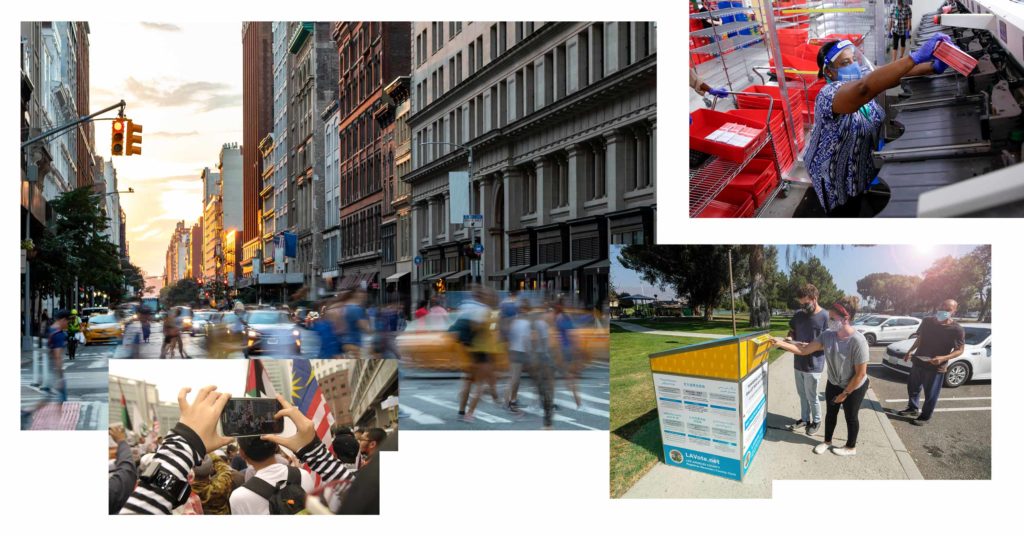
Fighting Discrimination and Promoting Equity
In 2021, CDT expanded our fight against uses of data and technology that discriminate against people based on race, gender, sexual orientation, disability, and other protected characteristics.

Checking the Power of Surveillance and Data Sharing
In a world where so many aspects of daily life rely on technology, privacy and security protections are more important than ever.

Reunited for Tech Prom and It Feels So Good
After an all-virtual (but still great) Tech Prom in 2020, CDT was able to get the tech policy community back together in person for the most popular annual tech gathering in the Beltway. Tech Prom 2021 drew more than 500 guests from government, tech companies, think tanks, and academia to Hook Hall, a fun D.C. venue that allowed for plenty of outdoor and distanced mingling.
Given the COVID-related safety restrictions still in place, the evening was a hybrid event, with online guests tuning in to Tech Prom from around the country for a “Live from the Red Carpet” chat with featured speakers.
The fun-filled evening brought in nearly $1 million to support CDT’s advocacy work – and reunited the tech policy community after far too long.
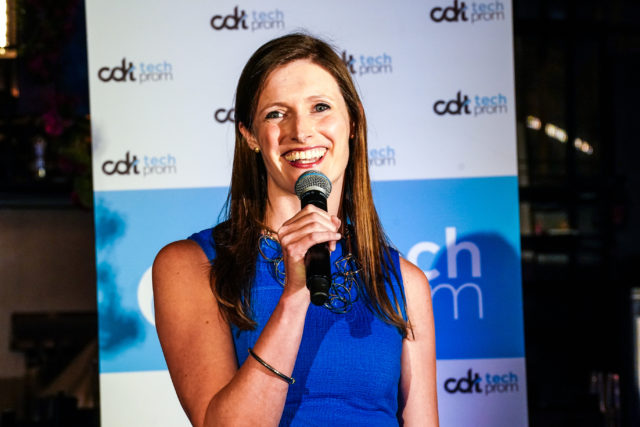
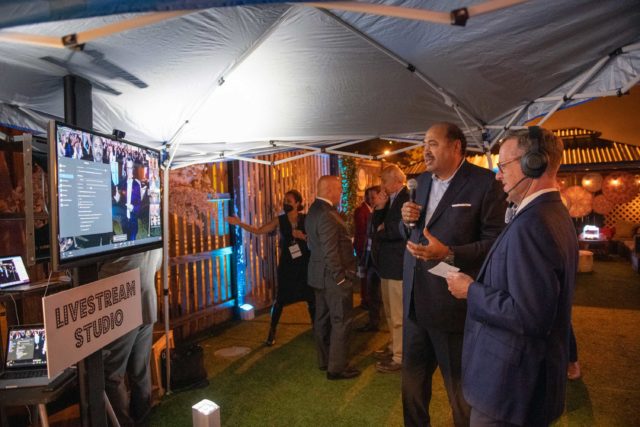
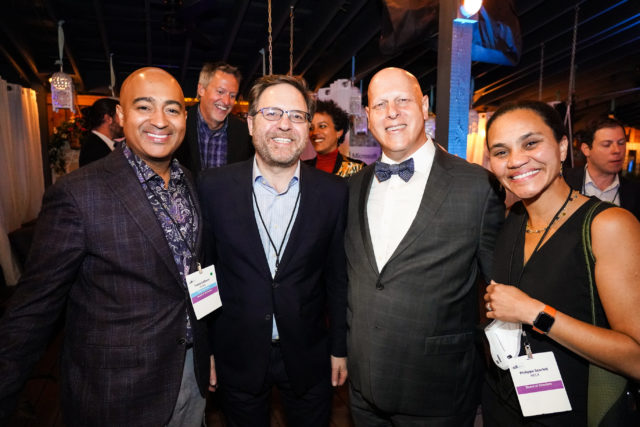


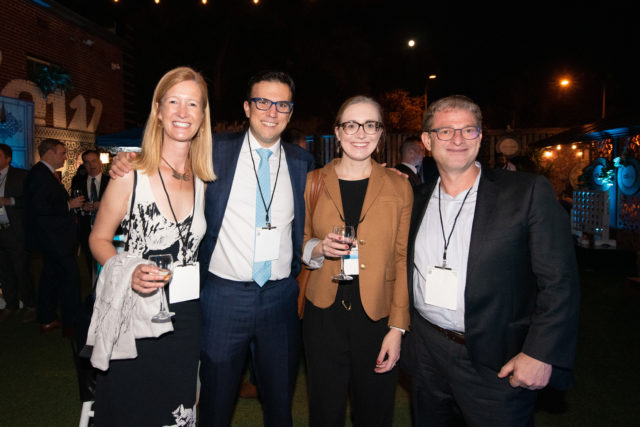
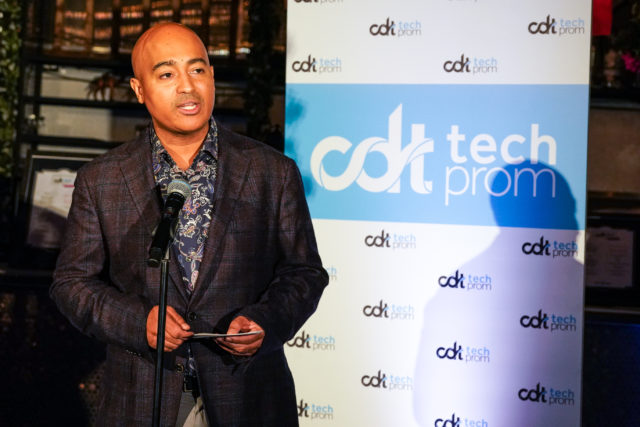
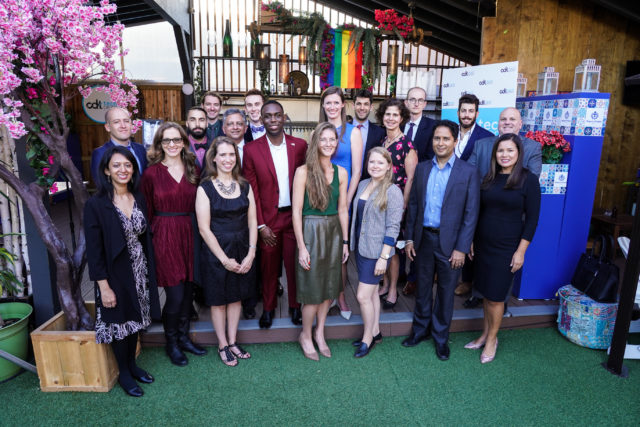
Click on any image to bring up gallery.
Financials

CDT is committed to sound financial stewardship and transparency. We have received clean audits each year from an independent auditing firm and have high ratings from nonprofit watchdogs Charity Navigator and GreatNonprofits. Our profuse thanks to our 2021 donors who make our work possible.
Board & Council
We are especially grateful to those who offer important insights on a regular basis and help to guide our work. We could not have such an outsized impact without your energy and efforts.
Previous Years
Reports from previous years.
